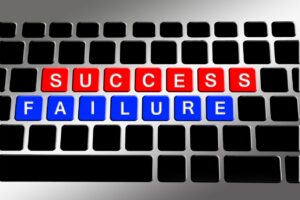The world of business is often a fast-paced one, an environment which requires attention to many details and dynamics. Those new to the entrepreneurial experience are usually shocked by the sheer amount of things which need to be done. In response to these needs, some business owners try to attend to more than one matter at a time, a solution often called “multitasking.” Unfortunately, abiding by the adage “killing two birds with one stone,” is a counterproductive solution.
When you multitask, you lose, plain and simple. Talking on the phone while picking-up groceries or walking the dog while replying to an email seem like smart time-saving ideas, but, they aren’t. You’ll forget the loaf of bread or to run spell check before hitting “send.” It’s a matter of attention, which is to say a matter of fact. We’re not biologically engineered to do multiple things at a time, which is why it’s tricky to pat your head and rub your belly simultaneously. When multitasking is attempted, your attention is less attentive to each task, and something inevitably gets missed.
How to Maintain Your Focus in Business
Let the nearby quote sink-in for a moment. How professional athletes, trained engineers, scientists, physicians do what they do best isn’t done by trying to do many tasks all at once. They use a process, an incremental approach to everything in a focused manner. When you play a game of chess or go into the gym, you do so with purpose. No matter what the experience, there is purpose, even watching a movie you’ve seen countless times has purpose–to unwind or just to re-live a feeling.
It’s not a big surprise that big league baseball players can hit a pitch far better than the rest of us. Research on the game’s best hitters has shown that they have excellent hand-eye coordination and can respond quickly to visual cues. Indeed, one of the keys to a superior ball player’s performance is excellent vision and focus that allow him to see a baseball perfectly as it travels at high velocity toward home plate. —Forbes
You’re in business for a purpose and a good one at-that. Regardless of what you sell, your aim is to fulfill a need and derive personal satisfaction, as well as a sense of accomplishment. Those are admirable but what’s probably holding you back from delivering your best is you’re not giving everything your best, you’re simply rushing through one task to get to the next–to rush through it as well. Your argument (read: rationalization) for doing so is that you simply don’t have enough time. Time management is an art-form, but it wouldn’t be as high a priority if you did not have to redo what you just did…again. By focusing, you’re not wasting time, you are ensuring thoughtfulness, quality, and attention to detail–the list goes on and on.

What you need to do to succeed in business is be in the business of taking care of business. This doesn’t mean taking an important phone call while on the treadmill and juggling to eat your lunch without spilling it. The person you’re speaking to will certainly know what you’re doing, even though he or she cannot see you, precisely because your attention is distracted. That does not equal good business practice, it undermines and worse, inflicts damage.
If “location, location, location,” means everything in real estate, then, focus is of the same importance in business. Here are some things you should be doing, every single day:
Eliminate distractions. It’s not rude if you close your office door or go outside to sit on a bench to concentrate, it’s healthy for your psyche, and, for your business. Although I have a home office, I purposely operate out of a professional business office that provides the environment, the accountability and allows me to be more focused and productive. Distractions are the hobgoblin of business, the less, the better.
Batch like tasks. If you read each email as it arrives, you’re doing it wrong. There’s an unseen, yet, really felt harm in doing so, because it breaks your focus. Batch similar tasks and schedule these in blocks. An example is email as the first, unfinished tasks as the second, new tasks as the third, you get the idea. Do what’s most productive and works best.
Prioritize according to importance. Our natural inclination is to do what’s easiest or what we most prefer, but we also are quite aware of the consequences. If you’re doing this, it’s why you don’t feel much personal satisfaction and like you’re not really moving your business forward.
Put everything in its place. You might call it O.C.D., but it’s actually very smart to have a place for everything and put everything in its place. I have very specific spots on my desk for client project priorities, my own business and personal business priorities, prospects, etc. Essentially, the only piles on my desk are those that are high priority so that my focus is aligned. The time you spend looking for this or that might be small, but add-up all those moments and you’ll marvel at the immense waste.
One last suggestion is to harness the power of your body’s healing power–sleep. It’s hard to be an entrepreneur but it’s even more difficult when you’re making it more difficult by not getting a good night’s sleep. Instead of watching the late night news, I started going to bed earlier. As a result, I have been getting up earlier to go to the gym, which provided energy and clarity for creativity and productive focus during my day. Turn off the technology, let your brain rest, and rejuvenate each and every night.
[shareaholic app=”follow_buttons” id=”26833294″]



